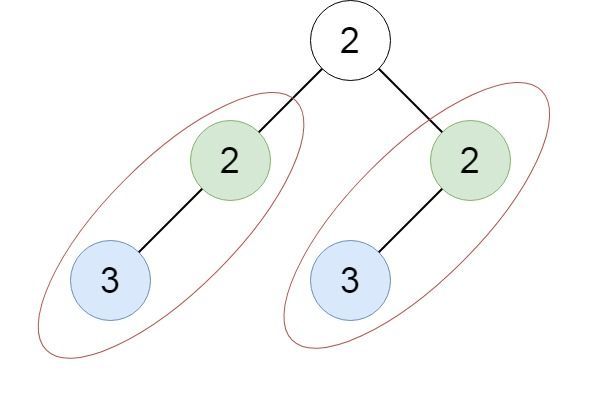Given the root of a binary tree, return all duplicate subtrees.
For each kind of duplicate subtrees, you only need to return the root node of any one of them.
Two trees are duplicate if they have the same structure with the same node values.
Example 1:
Input: root = [1,2,3,4,null,2,4,null,null,4] Output: [[2,4],[4]]
Example 2:
Input: root = [2,1,1] Output: [[1]]
Example 3:
Input: root = [2,2,2,3,null,3,null] Output: [[2,3],[3]]
Constraints:
- The number of the nodes in the tree will be in the range
[1, 5000] -200 <= Node.val <= 200
# Definition for a binary tree node.
# class TreeNode:
# def __init__(self, val=0, left=None, right=None):
# self.val = val
# self.left = left
# self.right = right
class Solution:
def findDuplicateSubtrees(
self, root: Optional[TreeNode]
) -> List[Optional[TreeNode]]:
def dfs(root):
if root is None:
return '#'
v = f'{root.val},{dfs(root.left)},{dfs(root.right)}'
counter[v] += 1
if counter[v] == 2:
ans.append(root)
return v
ans = []
counter = Counter()
dfs(root)
return ans/**
* Definition for a binary tree node.
* public class TreeNode {
* int val;
* TreeNode left;
* TreeNode right;
* TreeNode() {}
* TreeNode(int val) { this.val = val; }
* TreeNode(int val, TreeNode left, TreeNode right) {
* this.val = val;
* this.left = left;
* this.right = right;
* }
* }
*/
class Solution {
private Map<String, Integer> counter;
private List<TreeNode> ans;
public List<TreeNode> findDuplicateSubtrees(TreeNode root) {
counter = new HashMap<>();
ans = new ArrayList<>();
dfs(root);
return ans;
}
private String dfs(TreeNode root) {
if (root == null) {
return "#";
}
String v = root.val + "," + dfs(root.left) + "," + dfs(root.right);
counter.put(v, counter.getOrDefault(v, 0) + 1);
if (counter.get(v) == 2) {
ans.add(root);
}
return v;
}
}/**
* Definition for a binary tree node.
* struct TreeNode {
* int val;
* TreeNode *left;
* TreeNode *right;
* TreeNode() : val(0), left(nullptr), right(nullptr) {}
* TreeNode(int x) : val(x), left(nullptr), right(nullptr) {}
* TreeNode(int x, TreeNode *left, TreeNode *right) : val(x), left(left), right(right) {}
* };
*/
class Solution {
public:
unordered_map<string, int> counter;
vector<TreeNode*> ans;
vector<TreeNode*> findDuplicateSubtrees(TreeNode* root) {
dfs(root);
return ans;
}
string dfs(TreeNode* root) {
if (!root) return "#";
string v = to_string(root->val) + "," + dfs(root->left) + "," + dfs(root->right);
++counter[v];
if (counter[v] == 2) ans.push_back(root);
return v;
}
};/**
* Definition for a binary tree node.
* type TreeNode struct {
* Val int
* Left *TreeNode
* Right *TreeNode
* }
*/
func findDuplicateSubtrees(root *TreeNode) []*TreeNode {
var ans []*TreeNode
counter := make(map[string]int)
var dfs func(root *TreeNode) string
dfs = func(root *TreeNode) string {
if root == nil {
return "#"
}
v := strconv.Itoa(root.Val) + "," + dfs(root.Left) + "," + dfs(root.Right)
counter[v]++
if counter[v] == 2 {
ans = append(ans, root)
}
return v
}
dfs(root)
return ans
}/**
* Definition for a binary tree node.
* class TreeNode {
* val: number
* left: TreeNode | null
* right: TreeNode | null
* constructor(val?: number, left?: TreeNode | null, right?: TreeNode | null) {
* this.val = (val===undefined ? 0 : val)
* this.left = (left===undefined ? null : left)
* this.right = (right===undefined ? null : right)
* }
* }
*/
function findDuplicateSubtrees(root: TreeNode | null): Array<TreeNode | null> {
const map = new Map<string, number>();
const res = [];
const dfs = (root: TreeNode | null) => {
if (root == null) {
return '#';
}
const { val, left, right } = root;
const s = `${val},${dfs(left)},${dfs(right)}`;
map.set(s, (map.get(s) ?? 0) + 1);
if (map.get(s) === 2) {
res.push(root);
}
return s;
};
dfs(root);
return res;
}// Definition for a binary tree node.
// #[derive(Debug, PartialEq, Eq)]
// pub struct TreeNode {
// pub val: i32,
// pub left: Option<Rc<RefCell<TreeNode>>>,
// pub right: Option<Rc<RefCell<TreeNode>>>,
// }
//
// impl TreeNode {
// #[inline]
// pub fn new(val: i32) -> Self {
// TreeNode {
// val,
// left: None,
// right: None
// }
// }
// }
use std::rc::Rc;
use std::cell::RefCell;
use std::collections::HashMap;
impl Solution {
fn dfs(
root: &Option<Rc<RefCell<TreeNode>>>,
map: &mut HashMap<String, i32>,
res: &mut Vec<Option<Rc<RefCell<TreeNode>>>>,
) -> String {
if root.is_none() {
return String::from('#');
}
let s = {
let root = root.as_ref().unwrap().as_ref().borrow();
format!(
"{},{},{}",
root.val.to_string(),
Self::dfs(&root.left, map, res),
Self::dfs(&root.right, map, res)
)
};
*map.entry(s.clone()).or_insert(0) += 1;
if *map.get(&s).unwrap() == 2 {
res.push(root.clone());
}
return s;
}
pub fn find_duplicate_subtrees(
root: Option<Rc<RefCell<TreeNode>>>,
) -> Vec<Option<Rc<RefCell<TreeNode>>>> {
let mut map = HashMap::new();
let mut res = Vec::new();
Self::dfs(&root, &mut map, &mut res);
res
}
}


